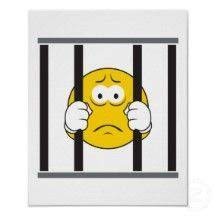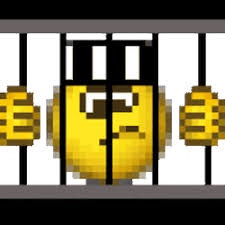C  has made me see the prison so clearly, unfortunately his recidivism and his own sufficient privilege mean that he has not benefitted from this tathata. has made me see the prison so clearly, unfortunately his recidivism and his own sufficient privilege mean that he has not benefitted from this tathata.
As humans we are free or in prison, and we make the choice to be free or imprisoned. What is the material that makes this prison? Ego and attachment. We make our own prisons.  When we choose to be free, we choose not to accept attachment – not to accept the conditioning that creates the attachment. When we choose to be free, we choose not to accept attachment – not to accept the conditioning that creates the attachment.
It is not completely true that we make our own prisons. We are born into prison even though when we are born we are essentially free. As we grow up our parents and society responding to our instincts help us to imprison ourselves, but mostly neither our parents nor society are aware they are helping us build our own prisons – they are part of the conditioned world and do not merit blame for our own predicaments.
Parents and society help us make agreements that accept we build our own prison. As we grow up those agreements help us fabricate the building materials of our prisons. Once as an adult we accept all the conformity of the prison, then our prisons have been completely fabricated – by egos and attachments.
As with all the movies, within us all is the desire for freedom; sadly for most of us there is a recidivism that accepts prison life. The recidivist can see freedom outside the prison, can be told there is freedom outside the prison, but their actions are such that they remain in prison choosing the security and limited privileges prison offers. They accept the known prison with its limitations as they are afraid of what freedom offers.
Within prison control is maintained through privileges that are usually concerned with levels of wealth - although there are prisons within the prison. For many people, the conditioning and those to whom prison gives the most privileges work together to maintain a certain order within prison, an order that discourages the imprisoned from seeking freedom. This order is maintained by violence – usually the institutional violence of conditioning, but on occasions prisoners inhibit the lives of those who are free. But for most in the prison it is enough to show them that there are privileges that can be strived for, and people sublimate their desire for freedom by desire for privilege; this is particularly true in a desire for wealth. There are many who strive for more wealth though they do not use that wealth when they have gained it – even when effectively that wealth is being taken from other prisoners.
Sadly within the prison there is a high percentage of people – the poor, who have such a lack of privilege – money, that all they can do is spend their lives trying to find sufficient money to survive – pay for sufficient shelter and food. Yet within the prison other more privileged prisoners see their suffering and don’t offer help – this lack of care increases their attachment to prison; this is a vicious cycle that can only be broken through freedom – in fact compassion is a good way to break out of the prison. In some cases these poor can find some freedom through accepting their situation, see the world for what it is, and be thankful for what they have and what they can enjoy.
For free people  there is no new world or country – no Shangri-laa of escape. Free people live in the same world as the imprisoned. But attachments, which become material for fabricating the prisons of others, don’t restrict the free because they just see the attachments for what they are and let them go. there is no new world or country – no Shangri-laa of escape. Free people live in the same world as the imprisoned. But attachments, which become material for fabricating the prisons of others, don’t restrict the free because they just see the attachments for what they are and let them go.
This release of attachment is not a given for the free, they have to work at it. Free people have gained their freedom through developing a practice that enables them to release the fabrications they made for their own prisons in their upbringing, and they continue to use and develop their practice so that they don’t attach and fabricate a new prison. 
So within the same world free people wander with enjoyment feeling, knowing and seeing the beauty of nature ensuring through their practice that they don’t fabricate new attachments to recreate the prisons they once had in their upbringings. Of course they have some sadness as their compassion sees so many people imprisoning themselves. Even that sadness can imprison but free people feel their love yet they have the wisdom to see the way life is and attachments are let go. Their freedom remains.
Maybe read Buddhadasa – Prison of Life or listen to this one hour talk..
Now for a perspective.
For those people who are not free, how do those people who are free see you? This perspective is so important for you to understand the strength of your ego - how much strength you have given the ego with your fabrications.  Within the prison of daily life there are people who have been forcibly incarcerated in jails. Within the prison of daily life there are people who have been forcibly incarcerated in jails.  What do you think about those people? Do you want to help them? You want to help them live free lives (as you understand freedom) - you have compassion for them and the life-choices (crimes) they have made. What do you think about those people? Do you want to help them? You want to help them live free lives (as you understand freedom) - you have compassion for them and the life-choices (crimes) they have made.
Does knowing about life in jail interest you? Does the way these inmates gain privileges from the jail establishment interest you? Are you usually interested in the way inmates cope with their daily life - unless they are loved ones? Not really - because it is part of jail. 
What about the ideas that inmates have about being free? What do you think about their "if only"s? If you know these inmates and know that if they are given jail-freedom they are likely to re-offend, do you listen to those ideas or dreams? No, because they are not ideas of the free - they do not have the reality of "freedom"; they are just jail-talk. 
Use this perspective to free yourself - help you get out of the prison you have fabricated. 
What happens to inmates when they have served their sentence? They leave jail  and join the prison of life and join the prison of life  , they are not free. These convicts have a personal history so that people in daily life don't trust them, they think "once a convict always a convict". It is so hard for ex-convicts to survive in daily life but it is possible if they completely change their lives and dissociate from the lives that led to jail. It is equally hard for people who have spent their lives in prisons of their own egos , they are not free. These convicts have a personal history so that people in daily life don't trust them, they think "once a convict always a convict". It is so hard for ex-convicts to survive in daily life but it is possible if they completely change their lives and dissociate from the lives that led to jail. It is equally hard for people who have spent their lives in prisons of their own egos  to become free. They have to completely dissociate from the lives that had led to their ego-prisons in order to be free. There is no half-way house, dedicate yourself to freedom or remain in prison. to become free. They have to completely dissociate from the lives that had led to their ego-prisons in order to be free. There is no half-way house, dedicate yourself to freedom or remain in prison.
Use this perspective to free yourself - help you get out of the prison you have fabricated. 

|



 Zandtao Meditation page
Zandtao Meditation page
 Advice from Zandtaomed
Advice from Zandtaomed